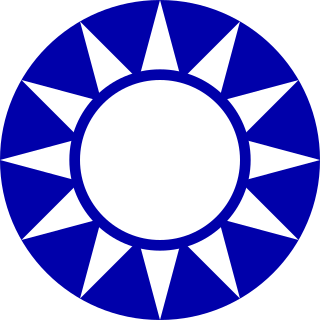
The Reformed Government of the Republic of China was a Chinese puppet state created by Japan that existed from 1938 to 1940 during the Second Sino-Japanese War. The regime had little authority or popular support, nor did it receive international recognition even from Japan itself, lasting only two years before it was merged with the Provisional Government into the Reorganized National Government of the Republic of China under Wang Jingwei. Due to the extensive powers of the Japanese advisors within the government and its own limited powers, the Reformed Government was not much more than an arm of the Japanese military administration.
The "800 Heroes Song" is also known by the title "China Will Not Perish". The song was written to commemorate the heroic efforts of the lone battalion of the National Revolutionary Army in the Defense of Sihang Warehouse during the final stage of the Battle of Shanghai (1937).

T'ang Leang-Li or Tang Liangli (1901–1970) was a journalist and politician in the Republic of China. He was an important politician during the Wang Jingwei regime. He was an overseas Chinese who was born in Java, Indonesia, and whose family place of origin was Fujian. His Indonesian name was Tubagus Pranata Tirtawidjaya.

'Yin Tong was a politician and military personnel in the Republic of China. He was an important person during the Provisional Government of the Republic of China and Wang Jingwei regime. His courtesy name was Tongsheng (桐聲). He was born in Jiangyin, Jiangsu.
Wang Xugao was a politician in the Republic of China. He was an important politician during the Provisional Government of the Republic of China and the Wang Jingwei regime. He was born in Penglai, Shandong.
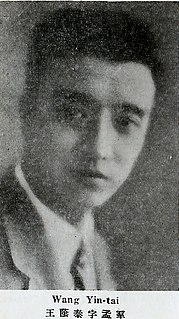
Wang Yintai was a politician in the Republic of China. He belonged to Fengtian clique, later he became an important politician during the Provisional Government of the Republic of China and the Wang Jingwei regime. He was born in Linfen, Shanxi, and original place was Shaoxing, Zhejiang. His father was a politician and scholar, Wang Shitong (王式通).
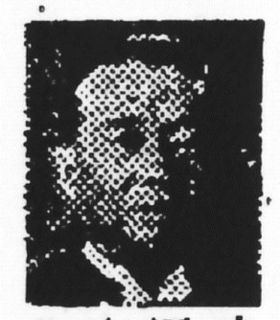
Wang Mo was a politician and educator in the Republic of China. He was an important politician during the Wang Jingwei regime. He was born in Yilong, Sichuan.

Wang Yitang was a politician and military leader in the Qing Dynasty and Republic of China. He belonged to the Anhui clique and formed the Anfu Club (安福俱樂部). Later he became an important politician in the Provisional Government of the Republic of China and the Reorganized National Government of the Republic of China. His former name was Zhiyang (志洋) and his courtesy names were Shenwu (慎吾) and Shengong (什公). Later, his name was changed to Geng (賡) while his courtesy name was changed to Yitang (一堂). He was also known by his art name Yitang (揖唐). He was born in Hefei, Anhui.

Wen Shizhen, also known as S. T. Wen, was a politician and diplomat in the Republic of China. He was Mayor of Tianjin during the Provisional Government of the Republic of China and the Wang Jingwei regime. His courtesy name was Peishan (佩珊). He was born in Tianjin.

Wen Tsung-yao, courtesy name Qinfu (欽甫), was a politician and diplomat in the Qing Dynasty and the Republic of China. In the late Qing era, he belonged to the pro-reform group. In the era of the Republic, he participated in the Sun Yat-sen's Canton Militarist Government. However, during the invasion of Japanese, he was a leading politician in the Reformed Government of the Republic of China and the Wang Jingwei regime, which were puppets state installed by the Japanese. He was born in Sunning, Kwangtung.
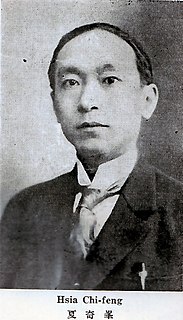
Xia Qifeng was a politician, diplomat and journalist in the Chinese Republic. He engaged in foreign affairs in the Beiyang Government and the Nationalist Government. In the end, he became an important politician during the Reformed Government of the Republic of China and the Reorganized National Government of China. His former name was Yun (雲). He was born in Taizhou, Jiangsu.
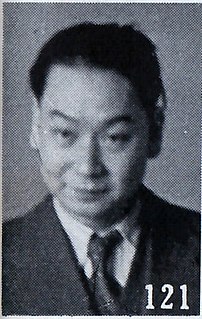
Zhou Huaren was a politician in the Republic of China. He was an important politician during the Wang Jingwei regime. He was born in Huazhou, Guangdong.
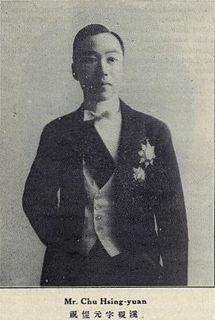
Zhu Xinyuan was a politician and diplomat in the Republic of China. He was an important politician during the Provisional Government of the Republic of China and the Wang Jingwei regime. His courtesy name was Yanxi (硯溪). He was born in Daxing, Zhili.
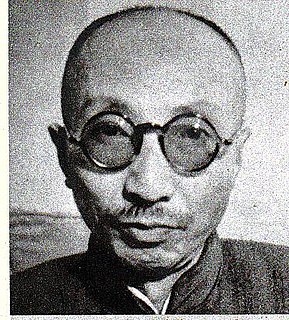
Zhu Qinglai was a politician in the Republic of China. He was an important politician during the Wang Jingwei regime (Republic of China-Nanjing. His given name was Xiang, but he was better known by his art-name Qinglai. He disappeared after the collapse of the Wang Jingwei regime.

Ku Cheng-kang or Gu Zhenggang was a Chinese politician, scholar and ranking member of the Kuomintang in service to the Republic of China.
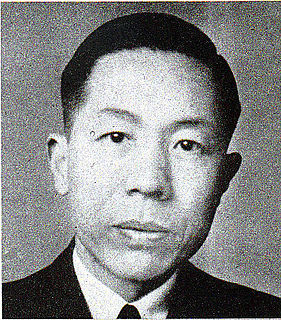
Li Shengwu was a Chinese politician and diplomat of the Republic of China who later became an important figure of the Wang Jingwei Government of Wang Jingwei.

Xie Shouchang known by his courtesy name Xie Guansheng (謝冠生) was a Chinese jurist who served as Minister of Justice from 1937 to 1948. After the government of the Republic of China moved to Taiwan, Xie was President of the Judicial Yuan 1958 to 1971.

The Wuhan nationalist government, also known as the Wuhan government, Wuhan regime, or Hankow government, was a left-wing nationalist government of China led first by Eugene Chen, and later by Wang Jingwei, that was based in Wuhan from 5 December 1926 to 21 September 1927. Following the capture of Wuhan during the Northern Expedition, the existing Kuomintang (KMT) government, which had been based in Guangzhou, moved there in December 1926. In April 1927, after National Revolutionary Army (NRA) commander-in-chief Chiang Kai-shek purged communists and leftists in the "Shanghai massacre", the Wuhan government split from Chiang in what is known as the "Nanjing–Wuhan split". Chiang subsequently formed his own government in Nanjing. While Chiang continued the Northern Expedition on his own, increasing tensions between communists and the KMT in the Wuhan government resulted in a new purge of communists from that government, and an eventual reconciliation with the Nanjing faction, after which the government moved to Nanjing.


